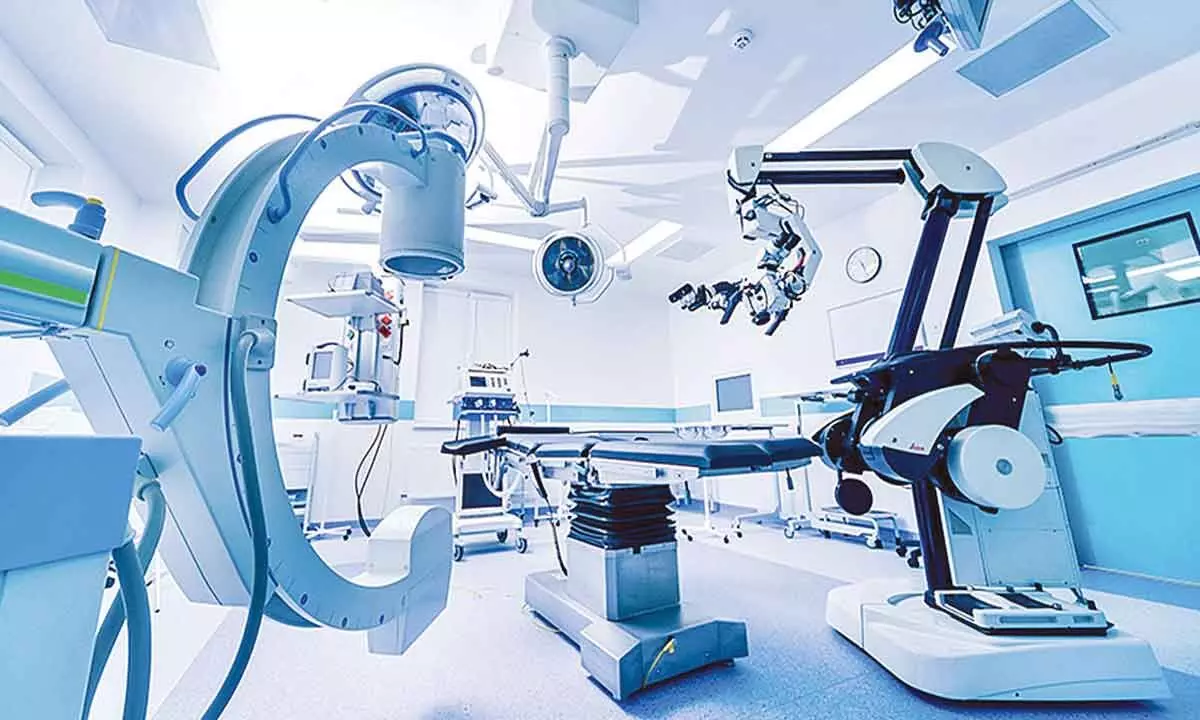A path-breaking initiative to streamline pharma & medical devices industries
The New Drugs, Medical Devices and Cosmetics Bill, 2022, seeks to regulate medical devices, clinical trials and e-pharmacy in India
image for illustrative purpose

In a path-breaking initiative which will have a cascading effect on pharmaceutical and medical devices industries in India, the Union Health Ministry has released the draft New Drugs, Medical Devices and Cosmetics Bill, 2022 which will replace the British era regulation of the Drugs and Cosmetics Act, 1940.
The newly released New Drugs, Medical Devices and Cosmetics Bill, 2022, is a comprehensive legislation with provisions to regulate medical devices, clinical trials and online pharmacy, among others in order to keep pace with changing needs, times, and technology. The draft includes provisions through which the Central Licensing Authority, can in public interest, abbreviate, defer or waive offer such pre-clinical and clinical data requirements for approval of such new drug, relating to life threatening of serious diseases or rare diseases or diseases of special relevance to the country, in such manner as may be prescribed.
Apart from the provisions to form Drugs Technical Advisory Board (DTAB), the Bill proposes constitution of Medical Devices Technical Advisory Board (MDTAB) to advise the Central Government and the State governments on technical matters pertaining to medical devices arising out of administration of the proposed Act. Besides, a Drugs, Medical Devices and Cosmetics Consultative Committee (DMDCCC) shall also be constituted by the Centre to advise the Central Government, the State Governments, the DTAB and MDTAB on any matter tending to secure uniformity in the country in the administration of the proposed Act and the rules made thereunder. The DMDCCC will be headed by the Drugs Controller General, India and shall consist of members representing the Central Government and the State government and shall meet at least once in six months.
In what can be a time step to meet any emergency situations like the pandemic, the new Bill says that the Centre can regulate or restrict the import of drugs, in public interest if the drug is essential to meet the requirements of an emergency due to epidemic or natural calamities. If the use of any drug or cosmetic is likely to involve any risk to human beings or animals or that any drug does not have the therapeutic value claimed for it, the government may, by notification in the Official Gazette, prohibit the import of such drugs and cosmetics in public interest. In the draft Bill, the Chapter IV has been expanded to include clinical trial of drugs, along with the existing manufacture, sale and distribution of drugs and cosmetics.
If the licensing authority has reasonable ground for believing that any licensee has failed to comply with any provision of the Act or rules, may issue an "improvement notice" to the licensee stating the grounds, specifying the failure, and specifying the measures the licensee must take to secure compliance within a reasonable period of not less than 14 days. After the show cause notice, if the response is not satisfactory, the licensing authority shall suspend or cancel the license. The regulations related to clinical trials are also included in this chapter. For the import of drugs and cosmetics which are prohibited under the Act, officers of customs and officers empowered under the Customs Act, 1962, shall have the powers and the Commissioner of Customs or any officer authorised by the Government, may detain any imported package which he suspects to contain any prohibited drugs or cosmetics and shall report to the DCGI.
The Chapter also deals with the penalty for import of drugs or cosmetics in contravention of the proposed regulation. In yet another new feature, this time to give a boost to the alternative medicines, the draft has a dedicated Chapter, Chapter V, for Ayurveda, Siddha, Sowa Rigpa, Unani and Homoeopathic drugs, while in the Act of 1940, it was a part of the Chapter IV. An Ayurveda, Siddha, Sowa Rigpa, Unani, Homoeopathy Drugs, Medical Devices and Cosmetics Consultative Committee has been proposed in the Chapter V.
A Scientific Research Board will be constituted to support the regulatory authority on the scientific advances used for developing, innovative Drugs of Ayurveda, Siddha, Sowa-Rigpa, Unani and Homoeopathy, their safety and efficacy, devices and other such related matters. Further, sections on import of Ayurveda, Siddha, Sowa-Rigpa, Unani and Homoeopathy drugs and cosmetics, have also been added in the draft bill.
More importantly, the draft bill dedicates Chapter VI to import, manufacture, sale, distribution and clinical investigation of medical devices, which was earlier dealt in the Medical Devices Regulation, 2017. The Chapter also deals with the appointment of medical devices officer with the regulatory authority and the powers of the officer. Similar in the case of drugs and cosmetics, the licensing authority has to issue an improvement notice to the licensee if they have failed to comply with any provision of the Act and if the licensee does not take measures to secure compliance within a period of 14 days, the officer can suspend or cancel the license after due procedure.
Besides, in a hint to the government's plans in terms of approving online pharmacies, the draft bill prohibits any person from selling, keeping stock or exhibiting or offering for sale or distribute any drug by online mode, except under and in accordance with a license or permission issued by the authority. Of course, this new Bill is a right step by the Health Ministry to streamline pharmaceutical and medical devices industries in the country.
(The author is freelance journalist with varied experience in different fields)

